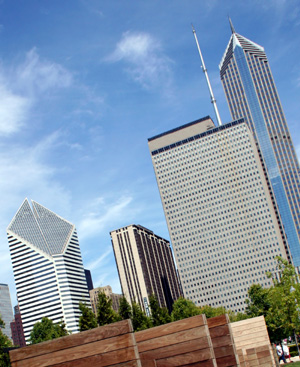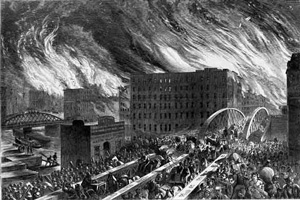Fire Extinguisher : 101
Examining the Great Chicago Fire
| Home |
| About Fire Extinguishers |
| Using a Fire Extinguisher |
| Fire Prevention |
| Fire Hazards |
| First Aid for Fire |
| Financial Protection |
| Biggest Fires in History |
| Firefighters |
This site was voted:

by onlinefiresciencedegree.org
(scroll to 74 on the list)
This page is intended to provide information pertaining to the great Chicago fire. |
After an unusually dry summer in 1871, the city of Chicago in Illinois U.S.A. experienced what is likely one of the biggest fires in history. It is undoubtedly the most infamous in the past century. At around 9pm in the evening of October 8th, a small shed or barn behind 137 DeKoven Street erupted into flames. The original cause of the blaze was never completely confirmed, and colorful accounts were circulated for years afterwards.
|
|
 Chicago - today |
One popular story placed the blame on an irritated cow that overturned a lantern, as reported by Michael Ahern of the Chicago Republican, who later admitted that his account was made up to sell papers. No other reported causes for the Great Chicago Fire were decisively factual.
How Did the
Fire Spread?
A collection of conditions caused the barn fire to spread across the heart
of the city, destroying almost 4 square miles. The city had been using
wood for many of the local building projects, including newly-finished
wooden sidewalks throughout the downtown streets. Combined with that summer’s
drought and a strong southwest wind, the city quickly went up in flames.
Perhaps if the townsfolk had reacted sooner, or the firefighters had not
been exhausted from fighting a fire the day before, the resulting events
may have been different.
Lasting until the early morning on October 10, the fire razed more than 2000 acres in only twenty-seven hours. It spread from the barn on DeKoven Street, owned by Patrick O’Leary and his wife Catherine, to the heart of the city, encouraged by a relentless wind that was quickly pushing the fire northeast.
After a church on the west side of the Chicago River went up in flames, the fire crossed over the span of water to the east side, at the south branch. Fed by stored firewood, coal and lumber yards that lined the river, and even the ships within the water, the Great Chicago Fire was very soon uncontrollable, and later deemed to be one of the biggest fires in history.
Despite the mayor’s requests for help from nearby cities, the flames became virtually unstoppable, especially when the Chicago waterworks were razed, cutting off the water supply. It was only once the winds died down on Monday evening, followed by a light rain, that the fire began to calm down. But it had already spread across Chicago, creating a 34-block path of burnt remains.
Result of
One of the Biggest Fires in History
After more than a full day of burning, the Great Chicago Fire had caused
somewhere between 200 and 300 deaths. It also destroyed 17,000 structures
located in the downtown core and the north end of the city. Estimates
put a $222 million price tag on the damage that left 90,000 Chicago residents
homeless.
The city literally rose from the ashes afterwards and now boasts many memorials to the Great Chicago fire. Besides the Pillar of Fire bronze sculpture that sits on the supposed point of origin, DeKoven Street is also well marked now as the site of the Chicago Fire Academy. Many of the buildings in the downtown area were completely rebuilt, including the Palmer House Hotel. The city’s bustling economy and beautiful skyline were reborn.
National Fire Prevention Week is largely a byproduct of the disaster, although a more modern one. Forty years after one of the biggest fires in history, it was decided that a permanent event should help to commemorate the disaster. Much effort has been put into awareness and prevention in order to protect the public from similar future tragedies.
